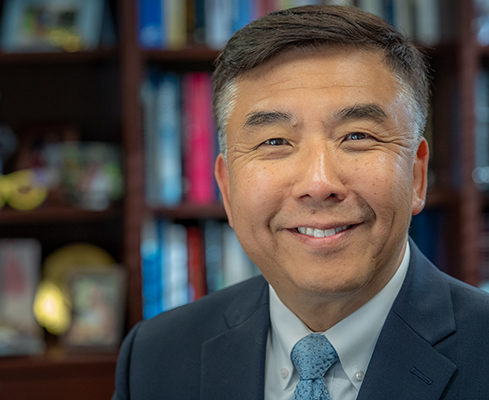
As a young oral surgeon in China, Yang Chai often operated on babies born with cleft lips or palates.
“You talk to the parents, and they were very emotional and trying find out why their kid got this cleft palate or other malformation in the face,” he said. “You can tell them all the statistics—one out of 700, one out of 1,500—but to them, it’s 100 percent because their kid has this disease. At that time, the whole field didn’t really have that much idea about what causes these congenital birth defects.”
This was the motivation for Chai’s lifelong dedication to the study and practice of craniofacial biology.
A Born Doctor
Chai was born into a family of cardiothoracic surgeons, orthopedic surgeons, pediatricians and other medical professionals in Beijing. His grandmother, a nurse, brought Chai to the hospital where she worked, and he was inspired by doctors’ ability to help patients recover from disease. He decided to pursue medicine with a specialty in the craniofacial region.
“I’ve always been interested in the face,” he said. “It’s really our identity, and we recognize each other largely by our facial features. And in China, craniofacial surgery or neck surgery is part of dentistry.”
Chai earned his undergraduate and professional degrees in oral medicine, also known as stomatology, at Peking University. Upon graduation, he treated many patients with craniofacial birth defects, such as cleft lip and palate, when he was a resident in Oral and Maxillofacial Surgery.
Committed to uncovering the underlying causes of these birth defects, Chai came to the States and pursued his PhD and postdoctoral training in USC’s craniofacial biology program, one of the oldest in the world, and his wife joined USC’s population research program. He also repeated his clinical training so that he could practice dentistry and oral surgery in the U.S., earning his DDS degree from USC. After his dental school graduation in 1996, he joined the USC faculty and now serves as the George and MaryLou Boone Professor of Craniofacial Molecular Biology, Associate Dean of Research, and Director of the Center for Craniofacial Molecular Biology (CCMB) at the Herman Ostrow School of Dentistry of USC. In 2018, Chai was elected to the National Academy of Medicine in recognition of his ground-breaking and influential research.
Stem Cells, Scaffolds and More
As a faculty member, his first project was a study of the cellular and molecular mechanisms underlying cleft palate. Today, he continues this line of research with a study of how two special populations of cells, called neural crest and muscle progenitors, interact to form the soft palate. In collaboration with USC Stem Cell scientist Megan McCain at the USC Viterbi School of Engineering, Chai’s lab is exploring potential clinical applications of this research by crafting 3D scaffolds to aid muscle regeneration and enhance the surgical repair of soft palate defects.
Using a similar 3D scaffold seeded with stem cells, Chai’s team is also forming strategies for improving the treatment of craniosynostosis, a dangerous birth defect that restricts brain growth due to the premature fusion of various sections of the skull. And a similar scaffold approach, using stem cells derived from dental pulp, has shown equal promise for treating skull injuries that are too large to heal on their own.
All of these scaffolds have produced promising early results in lab animals, and Chai hopes they will eventually advance to clinical trials for patients with these conditions.
As a dentist and oral surgeon, Chai is also committed to understanding tooth root formation, which could have applications for improving dental implants. Although implants have a success rate exceeding 90 percent, patients with multiple implants lack the natural ligaments and nerves to help gage the amount of force to use when biting into foods of different textures. As a result, some patients eventually fracture their implants. Chai hopes to discover and harness cellular and molecular mechanisms that could enhance the regeneration of these ligaments and nerves to create better biological implants.
His lab also studies the molecular and cellular mechanisms involved in forming everything from the tongue to the teeth to the skull, in the hopes of enhancing our understanding of normal craniofacial development as well as birth defects.
To bridge the gap between these laboratory discoveries and patient cures, Chai recognizes the importance of collaborations between biologists, engineers, clinicians and many others.
“Over the years, the most exciting thing is to work with a lot of smart people,” he said. “I’m just humbled to see the colleagues that we have at USC and also, of course, the interactions I’ve had with people from all over the world.”
As one example, he’s currently collaborating with colleagues at UCLA, UC San Francisco, UC San Diego, UC Davis, UC Berkeley, Stanford University and City of Hope to form an NIH-funded Center for Dental, Oral and Craniofacial Tissue and Organ Regeneration, or C-DOCTOR for short. This center aims to accelerate tissue engineering and regenerative therapies into clinical trials to treat dental, oral and craniofacial conditions.
Another multi-institutional collaboration, called FACEBASE, is essentially “crowd-sourcing” a large, NIH-funded and publicly available database related to craniofacial development. The massive amounts of resulting data are maintained by Carl Kesselman, director of the Biomedical Data Center at the USC Viterbi School of Engineering.
Despite his busy and productive research portfolio, Chai still devotes his Thursdays to seeing patients as a general dentist and oral surgeon.
“I’ve continued that throughout my career, because I really love the interaction with patients, and it’s a very rewarding process,” he said. “If I can help one or just a few patients to make their lives better, I think that’s worth it.”
